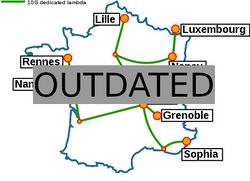Grid5000:Home: Difference between revisions
No edit summary |
Ddelabroye (talk | contribs) No edit summary |
||
| Line 85: | Line 85: | ||
Champagne-Ardenne<br/> | Champagne-Ardenne<br/> | ||
Provence Alpes Côte d'Azur<br/> | Provence Alpes Côte d'Azur<br/> | ||
Hauts de France<br/> | |||
Lorraine<br/> | Lorraine<br/> | ||
|} | |} | ||
Revision as of 13:26, 2 August 2018
|
Grid'5000 is a large-scale and versatile testbed for experiment-driven research in all areas of computer science, with a focus on parallel and distributed computing including Cloud, HPC and Big Data. Key features:
Older documents:
|
Random pick of publications
Five random publications that benefited from Grid'5000 (at least 2937 overall):
- Alexandre Bonvoisin, Clément Quinton, Romain Rouvoy. Understanding the Performance-Energy Tradeoffs of Object-Relational Mapping Frameworks. SANER'24 - 31th IEEE International Conference on Software Analysis, Evolution and Reengineering, Mar 2024, Rovaniemi, Finland. pp.11. hal-04401643v2 view on HAL pdf
- Georges da Costa. Hardware and application aware performance, power and energy models for modern HPC servers with DVFS. Sustainable Computing : Informatics and Systems, 2025, 46, pp.101106. 10.1016/j.suscom.2025.101106. hal-04983485 view on HAL pdf
- Samuel Pélissier, Abhishek Kumar Mishra, Mathieu Cunche, Vincent Roca, Didier Donsez. Efficiently linking LoRaWAN identifiers through multi-domain fingerprinting. Pervasive and Mobile Computing, 2025, 112, pp.102082. 10.1016/j.pmcj.2025.102082. hal-05120767 view on HAL pdf
- Philippe Ledent, Radu Mateescu, Wendelin Serwe. Testing Resource Isolation for System-on-Chip Architectures. MARS 2024 - 6th Workshop on Models for Formal Analysis of Real Systems, Apr 2024, Luxembourg, Luxembourg. pp.1-40, 10.48550/arXiv.2403.18720. hal-04573384 view on HAL pdf
- Jérôme Rouzé, Nouredine Melab, Daniel Tuyttens. A Parallel Genetic Algorithm for Qubit Mapping on Noisy Intermediate-Scale Quantum Machines. International Conference in Optimization and Learning - OLA 2024, May 2024, Dubrovnik, Croatia. hal-04916922 view on HAL pdf
Latest news
Failed to load RSS feed from https://www.grid5000.fr/mediawiki/index.php?title=News&action=feed&feed=atom: Error parsing XML for RSS
Grid'5000 sites
Current funding
As from June 2008, Inria is the main contributor to Grid'5000 funding.
INRIA |
CNRS |
UniversitiesUniversité Grenoble Alpes, Grenoble INP |
Regional councilsAquitaine |


